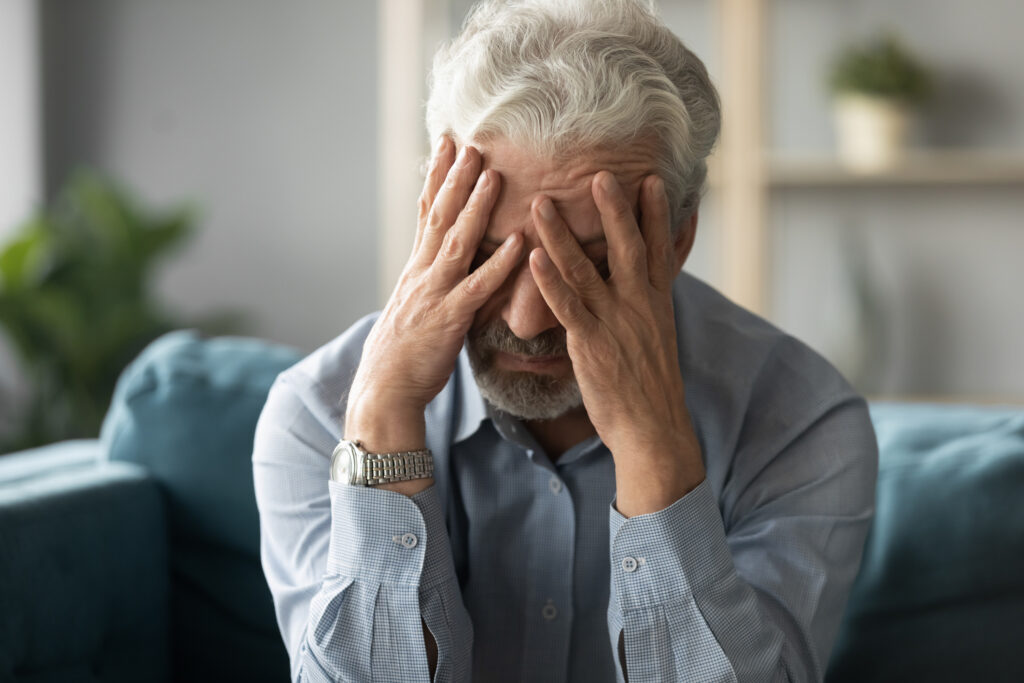Easing Anxiety through TMS Treatment

Transcranial magnetic stimulation (TMS) is an effective treatment for anxiety. It has very few side effects, just mild headache and slight tiredness. There is no medication involved and no risk of addiction, slips and falls, or cognitive slowing. While TMS use for anxiety is “off-label,” it should be considered as a mainstay option.

Symptoms
Anxiety is a persistent feeling of worry, nervousness, or unease, typically about an imminent event or something with an uncertain outcome. When it becomes frequent or interferes with daily functioning, an anxiety illness may be diagnosed. Anxiety often coexists with other conditions such as depression, PTSD, or sleep disturbances. Substance abuse often becomes a problem as people turn to alcohol, marijuana, or other substances to self-medicate their anxiety and then get hooked.
Hypervigilance
A state of enhanced alertness. Being highly sensitive to your surroundings.
Irritability
Easily irritated or frustrated.
Lack of Concentration
The inability to focus on the task or issues at han.
Racing Thoughts
Intrusive and Persistent thoughts that come in rapid succession.
Fatigue
Excessive tiredness, lack of energy.
How we are treating
depression with TMS?
Step 1
Contact us and provide your history of anxiety and any other coexisting illnesses, including your history of treatment. We will interview you at no cost to see if health insurance will cover you and, if not, what your other options may be. Unfortunately, health insurance companies often decline to cover TMS as an anxiety treatment on the grounds of it being “off-label.”
Step 2
Come to our clinic for about 15 minutes, five times per week, for six weeks. The treatment itself will only take up about three minutes of your visit, and when it’s finished, you can return immediately to work or family life. No medication is used.
Step 3
Participate in our life skills classes, acupuncture or acupressure, and our biofeedback program sessions at no added cost. TMS works best as part of a comprehensive care package. Weekly psychotherapy with your own therapist is also strongly encouraged and typically leads to better outcomes.
Our experts

Doctors Profile
John l Fleming, MD. DLFAPA.
Medical Director of SCTMSC, LLC, John is a Board Certified Psychiatrist and a Distinguished Life Fellow of the American Psychiatric Association. He has over 40 years’ experience treating depression and related conditions and is recognized as a leader in the psychiatric profession. Since 2011 he has been a certified Provider Trainer and TMS provider for three different TMS treatment systems. His experience base includes psychopharmacology of complex conditions. psychotherapy of individuals and couples and the medical aspects of psychiatric illness. He has annually been selected by his peers as one of America’s Best Doctors since 2005.

Melissa Hammock, M.A., M.Ed., LMFT
Services Director of SCTMSC, LLC, Melissa received her master’s degree in Marriage and Family Therapy from Azusa Pacific University and her master’s in special education from California State University, Los Angeles. Melissa is a Certified Life Coach and a member of the International Positive Psychology Association. Melissa is also a Certified TMS Provider.
Melissa has been in private practice in Colorado Springs since 1981, working with adults, adolescents, and couples. Melissa specializes in the treatment of depression, anxiety, ADHD, and trauma-based disorders. She has received training in EMDR, Cognitive Therapy, Family Systems Therapy, Energy Therapies, Interpersonal Therapy and Accudetox. Melissa is a Licensed Marriage and Family Therapist. She has been involved with TMS treatment since 2011.

Joe Hammock, M.A., PhD, Licensed Clinical Psychologist
Clinical Director of SCTMSC, LLC and Certified TMS Provider since 2011, Joe is a licensed psychologist and member of the American Psychological Association. He is a graduate of Fuller Graduate School of Psychology, and additionally holds an MA from Fuller Theological Seminary. He is certified by the International EMDR Association and is a Certified TMS Provider.In his thirty years of practice in Colorado, he has specialized in the treatment of trauma-based disorders, depression, anxiety disorders, and dissociative disorders. He also has extensive experience in psychological evaluations, CBT, EMDR, forensic psychology, and is frequently consulted as an expert witness.
FAQ
What are the types of anxiety disorders?
There are six recognized types of anxiety disorder, categorized by the situations in which the anxiety emerges. The most common is generalized anxiety, in which symptoms arise throughout the day without regard to what is happening. The other types are agoraphobia (fear of leaving your house or going to unfamiliar places), social anxiety disorder (fear of being in social situations), separation anxiety disorder (fear triggered by being away from familiar people), and other phobias (fears triggered by being around specific triggers such as spiders, heights, or unclean places). Periods of anxiety that escalate to the level of panic within the first few minutes and then last for up to a few hours are called panic attacks or panic disorder.
What are the therapeutic options for treating anxiety?
There are many different options for treating anxiety. However, it is often so persistent that it may be difficult to gain effective control.
Psychotherapy treatment is essential in managing any anxiety problem. Without a therapist’s assistance in exploring the problems with your thought patterns, their origins, and potential strategies for change, your underlying anxiety is unlikely to improve. Unfortunately, many people with anxiety attempt to manage it with medications alone, because they fear that talking about their anxiety will make it worse. Therapy itself may even become a new phobia, making it even more difficult for the individual to make meaningful progress.
Skills training is another important approach to managing anxiety and correcting underlying problems. There are many different forms of therapeutic skills training, but skills training for anxiety often includes biofeedback technology, which allows patients to view their heart rate and breathing rate during practice. This can be helpful in breaking certain physical habits that cause or exacerbate anxiety, such as overbreathing. Even though a feeling of oxygen deprivation is a common symptom of a panic attack, breathing too fast and lowering the body’s carbon dioxide level can actually make anxiety worse. Anxiety can also occur when a person’s heart rate and breathing rate fall out of sync. Biofeedback helps patients practice resynchronizing them. This technique is called Heartmath and is offered as part of every TMS treatment at our center. Other effective methods we provide include progressive relaxation, exposure-response prevention, eye movement desensitization and reprocessing (EMDR), auricular acupuncture or acupressure, and massage.
What are the medication options for treating anxiety?
There are four main classes of anti-anxiety medication treatment.
- Benzodiazepines (such as Xanax®, Klonopin®, Ativan®, Valium®, and others). Used as short-term aids, these can reduce anxiety once it appears. They are somewhat helpful in reducing anxiety episodes if taken regularly, but chronic use can lead to increased tolerance, lowered effectiveness, and addiction. Too much of a benzodiazepine can also cause shallow breathing and other complications.
- Antihistamine (anti-allergy) medications (such as Benadryl® and many others). These medications can reduce anxiety for a few days, but the body rapidly acclimates to them, reducing their effect. They can also cause significant drowsiness.
- Sedatives, which make the central nervous system less reactive and thereby reduce anxiety. Sedative anti-anxiety medications come from many classes, including medications used for seizures, antipsychotic medications, and mood stabilizers. Most of these do not cause addiction but may make the patient cognitively or emotionally blunted.
- Antidepressant medications, particularly those that impact serotonin levels. These are considered the safest medications for anxiety, and can often block symptoms from emerging. They are not very effective at reducing anxiety once symptoms have already emerged, however, so they may not provide sufficient relief alone. Antidepressant side effects are common and include nausea, weight gain, dry mouth, blurry vision, constipation or diarrhea, and low sex drive or problems with sexual performance.
How does TMS help with anxiety?
TMS treatment does not use medication, so medication side effects are not an issue. During treatment, a TMS (MRI) coil is placed over the part of the brain that becomes overactive when someone has anxiety. This part of the brain, the right dorsolateral prefrontal cortex can learn to slow itself down if it is given “inhibitory” pulses of energy. The magnetic energy only goes about an inch to an inch-and-a-half into the brain, in a region the size of a quarter. The rest of the brain and the body are not affected. These inhibitory pulses, applied in daily treatments over about four to six weeks, gradually retrain the relevant region of the brain to self-regulate and reduce overactivity. This in turn reduces both anxiety symptoms and the patient’s need for anxiety medication.
Does health insurance cover TMS treatment for anxiety?
TMS use for anxiety is considered “off-label” by most insurance companies and thus may not be eligible for coverage. However, many people with anxiety also have depression (up to 60%). If this is the case for you, and you meet the standards for TMS depression treatment, then anxiety-focused (right-sided) treatment can be added to your TMS treatment plan at no additional charge and with no need for insurance approval. If you do not suffer from serious depression in addition to anxiety, then private pay for “off-label” treatment can be arranged.
Mental Health Assessment
Do you believe that you suffer from depression or anxiety? Check out our online assessments for a quick online self-assessment to see if you suffer from a mental health related issue and to see if you qualify for treatment with TMS.
What the Patients Think

Cindy – 22
The Southern Colorado TMS Center is truly the most caring, compassionate mental health facility I have ever known. You always hear stories about why people have gone into the mental health field, but these folks truly live it. Everyone who works for SCTMSC (and I mean everyone), exudes warmth and empathy. They walk the walk. One of my family members utilized several of their services, and I got to witness firsthand how they deal with patients. I would highly recommend them to anyone suffering from depression, because they not only offer treatments but expect patients to participate fully in their recovery.

Pam – 25
Dear TMS staff, I want to express my thanks for all your sincere help while I went through a very difficult time. Every time I went to the center the staff was so kind and understanding. The educational classes in the evening were wonderful and I have learned so much about depression. I still look at the handouts you provided. I have gotten into meditation and continue to educate myself about depression and anxiety. If I watch “Friends” on the TV, I will always think of my experience at the Southern Colorado TMS Center!! Thank you for doing your job so well.

Barb – 46
All the staff at SCTMSC are very caring during all of the components of the TMS treatment. From dealing with insurance companies to adjusting one’s treatment time due to conflicts with your schedule; they are all wonderful. I would recommend TMS treatments to any person suffering MDD, as I have for many years. From my experience, TMS helped me far more than an anti-depression medication or CBT.

FB – 35
Dear TMS Team, I just wanted to say that 6 months after treatment, I am doing well. I have a new life and I am living it up. It is like being young again as I am finding my way again. I am so grateful to Dr. Fleming, Camice, Dawn and all the folks who helped me to get here! But especially to Dr Fleming.

Michelle – 37
Dear Dr. Hammock, I am so incredibly grateful and appreciative for all the time and attention you gave to my husband and me. Thank you, thank you for caring so much abut the individual person. I am also grateful that you took the time to help us separate out how we view ourselves in relation to our understanding of God’s love for us verses our symptoms of major depression; neither of us had realized or thought about that. That was incredibly insightful of you and so thoughtful of you to help us get to the root of it. Thank you for helping so many people. I can tell, that you and your team do a lot of good with very sincere hearts. It shines through unmistakably.

Jomaque C
I personally believe TMS should be the first line of treatment for major depressive disorder and generalized anxiety disorder – no medication changes and essentially no side effects! My treatment at Southern Colorado TMS Center is my second round of TMS therapy. The first round resolved my depressive symptoms for several years but when started feeling the depression come back, I knew exactly what to do. Southern Colorado TMS was able to get me scheduled quickly and started with therapy almost immediately. The staff worked on my behalf to have the treatment covered by insurance. I cannot speak highly enough about TMS therapy and Southern Colorado TMS. The therapy has improved my mood in just 8 weeks and the staff are top-notch! I felt welcome on each visit and appreciated the extra touches like a drink and snack after treatment. Southern Colorado TMS Staff – thank you so much for all your help!
Drug free solutions for optimized brain function
We focus on delivering real solutions for our patients. We know that patients can have real life-changing results through applying TMS.
Other Conditions
Depression in Adults
TMS treats depression without medication or medication side effects.
Depression in Adults
Many people suffer from depression. However, through the application of TMS they may find relief.
Post Partum
depression
Many mothers can suffer depression as a result of hormonal changes during or after pregnancy. TMS can help treat this type of depression effectively.
Post Partum
depression
TMS effectively treats depression during and after pregnancy, without the use of medication.
Depression in
Adolescents
TMS can effectively treat depression in teens.
Depression in
Adolescents
As a teen goes through difficult changes in their adolescent years, they can experience serious depression. TMS can help teens who suffer from depression.


